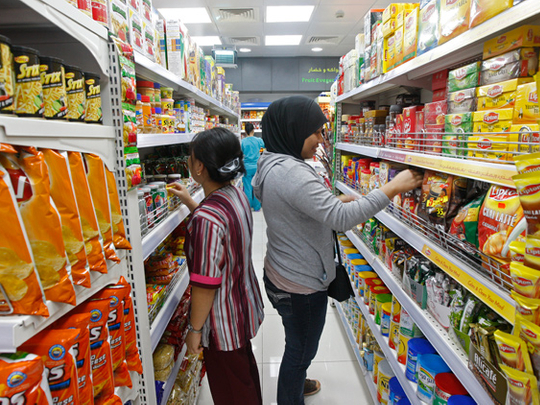
Government regulations to raise the standards of traditional groceries are providing an opportunity for international established grocery chains to enter the UAE market, analysts say.
The UAE’s grocery market reached $9.5 billion in 2012, with traditional or independent groceries making up 8,454 out of the 9,397 grocery outlets in the country, according to data by Euromonitor International. Only 943 are modern grocery outlets.
Many local groceries are unable to afford the changes required by Abu Dhabi’s regulations that aim to improve their appearance and standards — which is proving to be an opportunity for international established chains to step into the market.
Modern grocery retailers saw about seven per cent growth in the number of outlets last year, while traditional grocery outlets declined by almost one per cent, according to research by Euromonitor International.
“This trend is expected to continue over the next five years as more expatriates are expected to return to reside in the country in the wake of strong economic growth expected which is likely to spell the perfect opportunity for modern international brands to open up in the country,” said Sana Toukan, research manager for the Middle East at Euromonitor.
Modernisation
“The unique demographic makeup of the country with a large number of expatriates has attracted many international and modern grocery chains to open up outlets. Also, Abu Dhabi’s government’s recent move to impose regulations on small groceries further contributed to the modernisation of retailing,” she said.
Circle K, the Canadian-owned convenience store chain with 13,000 stores globally, is planning to invest Dh200 million to open around 500 stores in UAE and Saudi Arabia over the next four years in efforts to “modernise” the traditional grocery store market, said Fahmi Al Shawa, managing director of Circle K. Of the 1,300 groceries in Abu Dhabi, many will be unable to invest in the required upgrades and “sooner or later, will go out of business,” he said.
The grocery, owned by Canadian listed company Alimentation Couche Tard, has 33 stores in the GCC with 29 in UAE and four in Saudi Arabia.
Landlords in Dubai are also increasingly picky about the grocery retailers they select as tenants in their property, Al Shawa said. “A lot of developers in the last two years set their own standard of the type of groceries, they don’t just accept anyone to come in. Landlords also want accountability and a responsible corporation.”
Competitive prices
In the UAE, the chain plans to expand with more than 150 outlets in the next three years, Al Shawa said.
Circle K is planning to spend about Dh8 million to open at least 10 new stores in Abu Dhabi alone, he said. “We can go up to 50 stores if we get the locations. It is easy to go to Abu Dhabi and put a premium, but to maintain competitive prices the biggest barrier is operational costs like rent.”
The regulations for local groceries are “long overdue,” he noted. “The groceries need a minimum set of standards to follow.”
Circle K saw 60 per cent growth last year after it added 13 new stores, he said.
The international chain recognises that it must cater to customers from all social and economic demographics. “We can’t come in and say I’m a premium grocery. We’ve got to compete with traditional groceries. We sell everything from the two-dirham samosas to the 30-dirham organic sandwich,” he said.
For its expansions, the company is considering acquisitions of existing chains but has not found appropriate venues because of “lack of organisation” in the grocery market, he said.
In Saudi Arabia, Circle K is investing Dh100 million to open outlets across Aldrees petroleum stations in 300 locations over the next three to four years, he said.











